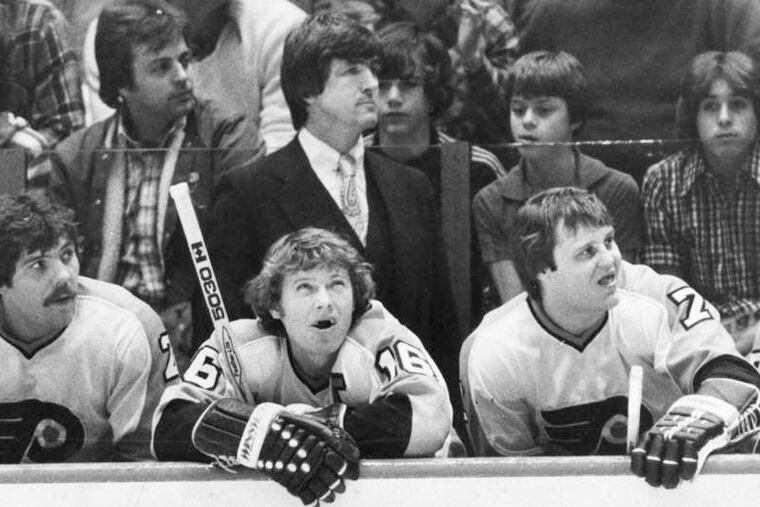Former Flyers coach Pat Quinn dies at 71
UNIONDALE, N.Y. - Pat Quinn, who coached the Flyers to an NHL-record 35-game unbeaten streak in 1979-80, died Sunday night in Vancouver at age 71 after a lengthy illness.

UNIONDALE, N.Y. - Pat Quinn, who coached the Flyers to an NHL-record 35-game unbeaten streak in 1979-80, died Sunday night in Vancouver at age 71 after a lengthy illness.
Mr. Quinn was a big man with a gruff exterior, but he had a soft, caring side, said his former players.
"Next to Fred Shero, Pat was the best coach who ever coached here," said Flyers executive Bob Clarke, who played for Mr. Quinn during the remarkable 35-game streak. "He changed the way the game was played in those days. . . . Pat was the first NHL coach who brought the wingers off the boards and had them swinging across the ice, which was much more movement for the forwards.
"I think it confused the rest of the league until we lost in the [1980] Finals to the Islanders. . . . He changed the game with that style of play."
Paul Holmgren also played on the team that had the 35-game unbeaten streak.
"Outside of Clarkie, Billy Barber and Reggie Leach and probably Ricky MacLeish, we had a lot of no-name guys," said Holmgren, now the Flyers' president. "Up and coming [guys]. Kenny Linseman was a young guy, [Brian] Propp was a young guy, I was still pretty young in the game. Basically, outside of Jimmy Watson, Bob Dailey, and Moose Dupont, we had a lot of guys who were no-name guys like Mike Busniuk, Norm Barnes, and Frank Bathe.
"We went on that incredible run there where we kind of snuck up on everybody," he added. "Most of the credit goes to Pat because of the way he got the team to believe in themselves."
Holmgren said Mr. Quinn, who received his law degree from Widener after his playing days ended, stressed it's "not about the individuals, it's about the group. He brought those principles in every facet as a general manager or a coach or player."
Watson said Mr. Quinn "kind of reinvented the Flyers a little bit there. The Flyers had all that success [winning two Cups], but they had a little dip and then Pat came in and we took over again. So he kind of revitalized some careers."
Watson said Mr. Quinn was a "real structure-type coach in a good sense in that he made us very disciplined, but he also was kind of an innovator in that he wanted us to stay very offensive-minded. . . . So it was a combination of the two philosophies that are so prevalent in hockey today."
Mr. Quinn, who led Team Canada to the Olympic gold medal in 2002, coached the Flyers from 1978-79 to 1981-82 and compiled a 141-73-48 record. He coached for 15 NHL seasons, won two coach-of-the-year awards, and led Vancouver to the 1994 Stanley Cup Finals.
"Everybody respected him for how intense he was and how he got players prepared," said Flyers forward Vinny Lecavalier, who played for Mr. Quinn in the 2004 World Cup and on Canada's 2006 Olympic team.
Flyers general manager Ron Hextall recalled how he went to the Atlanta Flames' practice when he was a youngster because his father, Bryan, was on the team. He watched Mr. Quinn get into a fight that day with teammate Butch Deadmarsh.
"I was probably 8 or 9 years old. . . . It was a great fight. They were both bleeding," Hextall recalled. "After practice, they were standing outside the locker room and had their street clothes on and they were talking. The whole way home I grilled my father on, 'Why did they fight out on the ice? Why would they talk and why were they friends after that?' I couldn't quite grasp the concept, but I think it shows the competitor Pat Quinn was."
Holmgren called Mr. Quinn a mentor and said he was "always a guy to pick up the phone and call you just to check in to see how you were doing." He said most of the players who played for Mr. Quinn would have done "whatever he asked us to do. Run through that wall? Sure. How many bricks do you want left over?"
Flyers chairman Ed Snider said Quinn was "terrific at everything he did, including his job as chairman at the Hockey Hall of Fame."
"It's a horrible day for all of us," Clarke said. "I saw Pat last spring and he seemed fine. I guess when these things happen, they always seem to come on quick. You never have a chance to say goodbye."